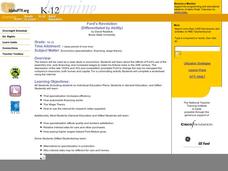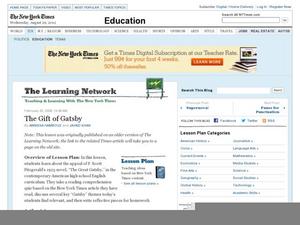Curated OER
ASL: Lesson 20
Teach it, learn it, communicate with it. ASL is at your fingertips with this sign language series. Lesson 20 focuses on classifiers, descriptive vocabulary, and asking questions. Each blue link on the page takes you to an image or video...
Council for Economic Education
Calculating Simple Interest
How much is owed? A calculated resource introduces the simple interest formula with a video that describes how to use it. Classmates then show what they know by answering questions within a simple interest worksheet.
Curated OER
Focus on Economic Data: US Employment and the Unemployment Rate, March, 2012
Read all about the various types of unemployment and the United States is are currently at the low-point of an unemployment cycle. Kids examine what economic factors affect the unemployment rate, and what data shows for different US...
Curated OER
Tides - The Ins and Outs of Tides
Get your junior oceanographers to generate tidal prediction graphs on an interactive website. They will feel like experts in the field, or shall we say, experts in the ocean! This is a brief, but worthwhile activity that could be used to...
National Park Service
Reduce Our Carbon Footprint, Let’s Compost!
Roll up your sleeves and get a little dirty with this elementary and middle school compost lesson. All you need is a large plastic container, a couple old newspapers, some organic waste, and a few hundred worms and you're ready to start...
Curated OER
Ford's Revolution
Industrialization and mechanization of products such as cars have deeply affected the US economy. The class discusses the affects of Ford's assembly line production of automobiles. They watch a video, fill out worksheets, and investigate...
United Nations
Compost Monitor Training
What should go in the trash, and what can be composted? Guide your young conservationists through the process of composing their trash with a lesson about the different ways we can dispose of garbage. Using a trash bag with clean...
Curated OER
A News Story of Your Own: Sentence and Lexical Variety
Given the two-sentence skeleton of a news story about a car theft/joy ride, budding writers create their own version of the story varying diction and sentence structure to heighten interest and complexity in their writing. Resource...
Curated OER
Human Cloning: Is it Biological Plagiarism?
Is cloning good or harmful? Help your class understand the risks and benefits as they read, research, and discuss human cloning. Individuals form teams, research information, and present to the class before concluding with an in-depth...
Curated OER
Bias and Crime in Media
Critical thinking and social justice are central themes for this resource on bias and crime in media. The class views and discusses an incisive PSA that highlights assumptions based on race. Small groups read newspaper opinion pieces...
Curated OER
Shaking the Movers: Youth Rights and Media
Children have rights! Exploring those rights and using media to express those rights is the focus of this Media Awareness Network lesson. Although some of the law links reflect the Canadian Articles of The Convention, the majority of the...
Curated OER
The Gift of Gatsby
A reading of “Gatsby’s Green Light Beckons a New Set of Strivers,” a New York Times article by Sara Rimer, triggers a discussion of the American Dream and what it means to strive for something. Following the discussion, class members...
Food Project
Introduction to Sustainable Agriculture and Food Systems
A series of hands-on, outdoor activities increase understanding of agricultural terms, soil management, pest control, and more. Plan ahead for this one as it requires a number of supplies and could be messy. Activities include...
Curated OER
Anti-Semitism Workshop
Originating from the Yad Vashem Holocaust Memorial Museum in Jerusalem, here is a resource to support your world historians in their study of World War II, the Holocaust, your cultural scholars learning about anti-semitism, or your...
Southern Nevada Regional Professional Development Program
Close Reading in the Classroom
Close reading is key to the analysis and interpretation of literature. A close reading of the title and the epigraph of “The Love Song of J. Alfred Prufrock” offers readers an opportunity to examine how even single words or names can...
Southern Nevada Regional Professional Development Program
Reading Literature - The Ruin
Cross-comparison, the technique of focusing on two different texts with the same themes, motifs, events, etc., is employed in an exercise that asks groups to examine two different translations of “The Ruin,” a poem, written in Old...
Southern Nevada Regional Professional Development Program
Vocabulary Activity
Talk about a menu! Who would have thought SAT prep could be so delicious? Treat your class to a full course of SAT words with a timed activity that asks groups to create clues for dishes on their bill of fare. Distained veggies anyone?...
Curated OER
The Job Interview: Teacher's Notes
One of the most difficult parts of getting a job, is the interview. Learners are each given a card with personal experience and information on it. They respond to an advertisement for a chef position at a Korean restaurant. Each person...
University of Southern California
Deconstructing Genocide: The Ultimate Crime Against Humanity
There are eight stages of an atrocity known as genocide, and it's important to understand how they are represented so we can fight against it in the future. As young historians watch video clips of ten Jewish Holocaust survivors'...
University of Wisconsin
Identifying Your Soil for Rain Gardens
Teach your class the descriptive characteristics of soil. Provide information about particle size and a flow chart for assessing texture. Soil scientists then analyze samples and hypothesize which would be the best type for a rain...
PBS
The Butterfly or Adult
Now that your class knows about the life cycle of a butterfly, it's time to discuss how an adult butterfly survives in the wild. The class diagrams and labels the parts of a butterfly, discusses how butterflies survive, and then make a...
Alabama Department of Archives and History
America in Space: German Voices from Huntsville, Alabama
Project Paperclip, the Redstone Arsenal, and the Huntsville Space Center are all featured in a resource that investigates the contributions of Dr. Werner von Brawn and other German scientists to the US space program. Working individually...
Alabama Department of Archives and History
Convict Leasing in Alabama: a System That Re-Enslaved Blacks After the Civil War
The post-Civil War convict leasing program, rarely covered in textbooks, is the focus of a lesson that asks class members to use information drawn from primary source documents to assess the program. While the focus is on Alabama's...
University of Chicago
Comparing Modern and Ancient Ideas of Ethnicity and Identity
Explore ethnicity and identity with a research and writing assignment. Class members conduct online research, looking in particular at images and carefully noting down their sources on notecards. They read about identity and compose...
Other popular searches
- Converting Minutes to Hours
- Hours in a Day
- Daylight Hours
- Afternoon Hours
- Seconds, Minutes, Hours
- Hours Minutes Seconds
- Hours Worked
- All Hours
- Quarter Hours
- Compute Hours Worked
- Hours and Minutes
- Math Hours

























